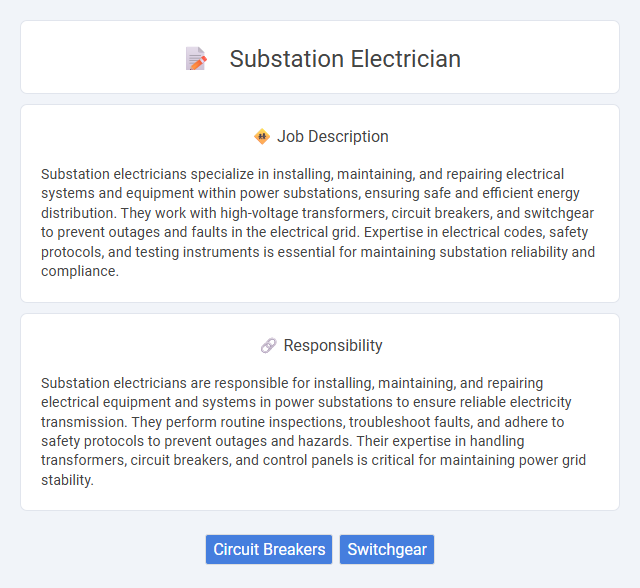
Substation electricians specialize in installing, maintaining, and repairing electrical systems and equipment within power substations, ensuring safe and efficient energy distribution. They work with high-voltage transformers, circuit breakers, and switchgear to prevent outages and faults in the electrical grid. Expertise in electrical codes, safety protocols, and testing instruments is essential for maintaining substation reliability and compliance.
Individuals with strong technical skills and a high level of physical fitness are likely to thrive as substation electricians due to the demanding nature of the job, which often involves working with high-voltage equipment in challenging environments. Those who are detail-oriented, safety-conscious, and able to work under pressure may find this career suitable, whereas people who struggle with complex problem-solving or have a low tolerance for stressful, potentially hazardous conditions might find it less fitting. The probability of job satisfaction increases for candidates who enjoy hands-on work and have a willingness to continually update their knowledge on electrical systems and safety protocols.
Qualification
A substation electrician must hold a relevant electrical qualification, such as an electrical trade certificate or an advanced diploma in electrical engineering. Extensive knowledge of high voltage equipment, wiring systems, and safety protocols is essential, often supported by industry-specific certifications like OSHA or NFPA 70E. Hands-on experience with testing, maintenance, and troubleshooting of substations ensures competence in detecting faults and maintaining reliable power distribution.
Responsibility
Substation electricians are responsible for installing, maintaining, and repairing electrical equipment and systems in power substations to ensure reliable electricity transmission. They perform routine inspections, troubleshoot faults, and adhere to safety protocols to prevent outages and hazards. Their expertise in handling transformers, circuit breakers, and control panels is critical for maintaining power grid stability.
Benefit
A substation electrician likely experiences enhanced job security due to the critical nature of maintaining electrical substations. The role probably offers competitive compensation and benefits, reflecting the specialized skills required. Opportunities for professional growth and advancement may also be more common within this field compared to general electrician positions.
Challenge
Working as a substation electrician likely involves navigating complex electrical systems and high-voltage equipment, which presents significant challenges in terms of safety and precision. Troubleshooting faults and performing maintenance under strict regulatory standards may require advanced technical skills and constant vigilance. The role probably demands adaptability to changing technologies and working conditions to ensure reliable power distribution.
Career Advancement
Substation electricians specializing in high-voltage equipment maintenance and repair can advance their careers by obtaining certifications in electrical safety and control systems. Mastery of SCADA systems and advanced troubleshooting skills increase eligibility for senior technician or supervisory roles. Continued education in grid automation and smart substation technologies opens pathways to engineering and management positions within utility companies.
Key Terms
Circuit Breakers
Substation electricians specialize in the installation, maintenance, and repair of circuit breakers, which are critical for controlling electrical power flow and protecting substations from faults. They perform routine testing, calibration, and troubleshooting to ensure circuit breakers operate reliably under high-voltage conditions. Expertise in various types of circuit breakers, including air, vacuum, and SF6 gas breakers, is essential for managing electrical safety and efficiency in substations.
Switchgear
Substation electricians specialize in installing, maintaining, and repairing high-voltage switchgear critical for power distribution and protection. Expertise in circuit breakers, disconnect switches, and busbars ensures reliable control and isolation of electrical circuits within substations. Proficiency in troubleshooting and testing switchgear components enhances system safety and operational efficiency in electrical infrastructure.
 kuljobs.com
kuljobs.com